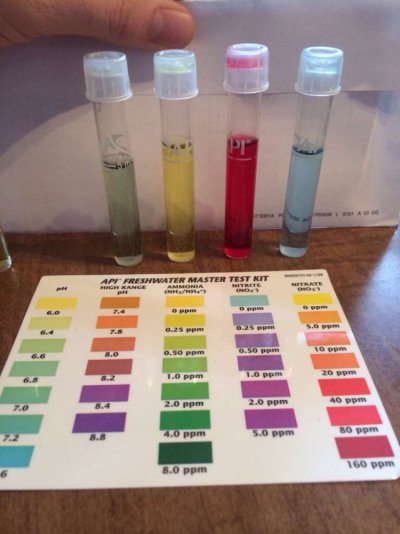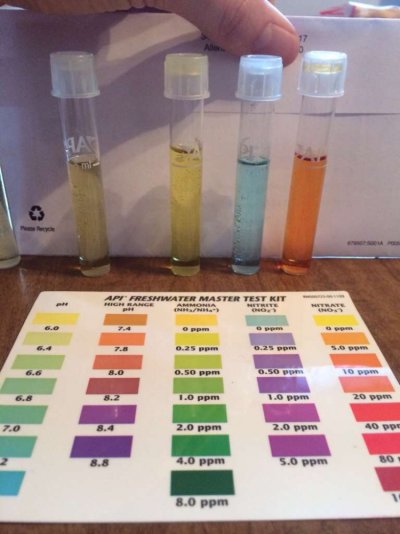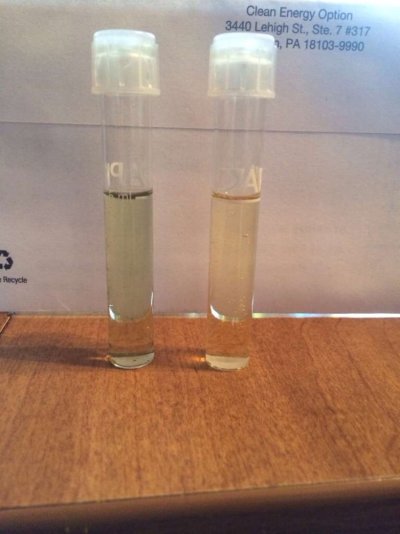Test your nitrates again and make sure you follow procedure. Your nitrates were at 160 and then you changed 25% and they're at 20-40? That doesn't add up, please elaborate.
Also, you should probably take a look at your stocking a little closer.
Tiger barbs need groups of 6 minimum for each kind. (i.e. 6 regular, 6 green, etc)
Regardless, you have ammonia in a cycled tank, your bioload is outweighing your bacteria. Test again, and I would make a 50% water change.
AqAdvisor had this to say about your stocking, and I don't even know what your filtration situation is:
Note: Kissing Gourami needs driftwood.
Warning: Kissing Gourami is not recommended to be with Blue Gourami - they may agressively fight.
Warning: Kissing Gourami is not recommended to be with Golden Gourami - they may agressively fight.
Warning: When Parrot Cichlid starts to breed, they may become too aggressive to co-exist with Kissing Gourami.
Warning: Tiger Barb may become food for Kissing Gourami.
Warning: Green Tiger Barb may become food for Kissing Gourami.
Warning: Serpae Tetra may become food for Kissing Gourami.
Warning: Cardinal Tetra may become food for Kissing Gourami.
Warning: Blue Gourami is not recommended to be with Kissing Gourami - they may agressively fight.
Warning: Blue Gourami is not recommended to be with Golden Gourami - they may agressively fight.
Warning: When Parrot Cichlid starts to breed, they may become too aggressive to co-exist with Blue Gourami.
Warning: Golden Gourami is not recommended to be with Kissing Gourami - they may agressively fight.
Warning: Golden Gourami is not recommended to be with Blue Gourami - they may agressively fight.
Warning: When Parrot Cichlid starts to breed, they may become too aggressive to co-exist with Golden Gourami.
Warning: Tiger Barb may become food for Parrot Cichlid.
Warning: Green Tiger Barb may become food for Parrot Cichlid.
Warning: Serpae Tetra may become food for Parrot Cichlid.
Warning: Cardinal Tetra may become food for Parrot Cichlid.
Note: Fire Eel may escape - lids are recommended.
Warning: When Parrot Cichlid starts to breed, they may become too aggressive to co-exist with Tiger Barb.
Warning: When Parrot Cichlid starts to breed, they may become too aggressive to co-exist with Green Tiger Barb.
Note: Chinese Algae Eater will become incredibly aggressive and destructive when they become adults.
Note: Rainbow Shark may jump - lids are recommended.
Warning: When Kissing Gourami starts to breed, they may become too aggressive to co-exist with Serpae Tetra.
Warning: When Parrot Cichlid starts to breed, they may become too aggressive to co-exist with Serpae Tetra.
Warning: Kissing Gourami is too aggressive to co-exist with Cardinal Tetra.
Warning: Blue Gourami is too aggressive to co-exist with Cardinal Tetra.
Warning: Golden Gourami is too aggressive to co-exist with Cardinal Tetra.
Warning: Parrot Cichlid is too aggressive to co-exist with Cardinal Tetra.
Warning: Tiger Barb is too aggressive to co-exist with Cardinal Tetra.
Warning: Green Tiger Barb is too aggressive to co-exist with Cardinal Tetra.
Warning: Chinese Algae Eater is too aggressive to co-exist with Cardinal Tetra.
Warning: Rainbow Shark is too aggressive to co-exist with Cardinal Tetra.
Warning: Banded Leporinus is too aggressive to co-exist with Cardinal Tetra.
Warning: When Parrot Cichlid starts to breed, they may become too aggressive to co-exist with Rosy Barb.
Note: Banded Leporinus may jump - lids are recommended.
Warning: Serpae Tetra may become food for Banded Leporinus.
Warning: Cardinal Tetra may become food for Banded Leporinus.
Warning: At least 5 x Cardinal Tetra are recommended in a group.



